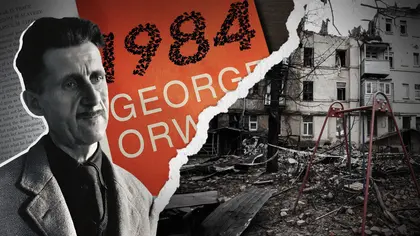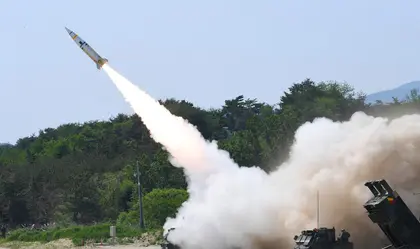Orwell’s reservations
After WWI, the British Peace Pledge Union emerged as the largest pacifist organization in Europe. During WWII, however, public British attitudes changed and pacifism was increasingly viewed as capitulation to the Germans and Japanese.
JOIN US ON TELEGRAM
Follow our coverage of the war on the @Kyivpost_official.
For example, George Orwell wrote in 1942, “Pacifism is objectively pro-Fascist. This is elementary common sense. If you hamper the war effort of one side you automatically help that of the other… The idea that you can somehow remain aloof from and superior to the struggle, while living on food for which British sailors risk their lives, is a bourgeois illusion bred of money and security.”
Though Orwell in December 1944 repudiated his claim that pacifists were objectively aiding the Nazis, the situation had changed dramatically by then. Victory seemed within reach and had it been otherwise it is very questionable whether he would have shown the same magnanimity toward those who in his former opinion, albeit unintentionally, aided Hitler.
Of course, pacifists are not fascists. But it is all too legitimate to recall that the best intentions and purest motives can have “sinister bedfellows” and dire consequences.
Moreover, Orwell never called for banning the right to dissent and pacifist activities, because that was exactly what characterized dictatorships like Japan and Nazi Germany.

Inside the South Korean Weapons Factory That Could Supply Kyiv
Nevertheless, he feared that in higher circles there was a willingness to negotiate surrender. “These people will get their chance, not in the moment of defeat, but in some stagnant period when boredom is reinforced by discontent. They will not talk of surrender, but only about peace; and doubtless they will persuade themselves, and perhaps other people, that they are acting for the best.”
Orwell’s fear did not materialize; in the end the Allies proved unwilling to allow Hitler, despite unprecedented Nazi criminality, to retain certain annexed territories in exchange for peace.
Those who would strongarm Ukraine into concessions
The cry “wars end at the negotiating table” may be very much in vogue during the current Russian war of annihilation against Ukraine, but the Germans and Japanese had no choice but to sign their capitulation. That the warring parties finally sat down at the negotiating table during the Yugoslav wars was because it was enforced by military means.
Still other conflicts such as Korea and Kashmir ended in a truce but not in an agreement, and were thus frozen, either to cause new tensions or to flare up at a later date.
Yet a number of Western Europeans and Americans are repeatedly calling, by open letter or otherwise, for their governments to push Ukraine and Russia to a ceasefire and negotiations. The main argument being that all suffering then soon will end.
“The sooner the weapons fall silent, the better it is for all concerned – for the Ukrainians, the Russians and the rest of the world,” is the conclusion of an appeal by Dutch intelligentsia. Would they likewise have called for negotiations with Hitler, who also believed that Ukraine had no right to exist except as Kornkammer des Reiches?
And what is there to negotiate with the current aggressor? Through Foreign Minister Sergey Lavrov, Russia recently reiterated that the goals of the “special operation” remain unchanged: capitulation and destruction of the Ukrainian state and control of the entire Ukrainian territory.
What about the Ukrainians?
Ukrainian suffering is the very reason why 85 percent of Ukrainians consider territorial concessions to Russia unacceptable, according to a recent poll by the Kyiv International Sociological Institute, “even if it means prolonging the war.”
To understand them read Stanislav Aseyev’s “The Concentration Camp on Paradise Street” about his imprisonment from 2017 to 2019 in “Donetsk’s Dachau” a notorious Russian prison in the self-proclaimed People’s Republic of Donetsk.
Indeed, it is rather arrogant to claim to know what is best for Ukrainians – as if Ukrainians still needed to be told how terrible war is. For them, however, one thing is worse: namely, that there would be nothing worth defending and fighting for.
Freedom from slavery has been a recurring theme in Ukrainian poetry and literature for more than a 150 years. “How am I to live in slavery with no hope? Please tell me, lest I go crazy,” wrote writer, poet, artist and founding father of Ukrainian culture Taras Shevchenko (1814-1861).

When Ukrainian troops had liberated the town of Borodyanka, the Taras Shevchenko monument appeared damaged. Bullets had hit the Ukrainian poet's forehead. Artist Yaroslav Halubchik from Kyiv wrapped bandages around his wounds.
That the word volya, which means both “will” and “freedom” is one of the most popular tattoos Ukrainians have inked on their skin since Feb. 24, 2022 is is just as telling.
Yet even in Western Europe a paternalistic colonial attitude prevails, attributing to Ukraine and Eastern Europe a general incapacity to manage their own affairs.
NATO expanded by request, not coercion
Take for example, the much discussed eastward NATO expansion. Although former Warsaw Pact countries sought accession because they realized that the end of the Soviet Union did not mean the end of Russian imperialism, people in the West also proved susceptible to the idea promoted by Moscow that this was due to American pressure.
In reality, Presidents George Bush Sr. and Bill Clinton were initially reluctant to expand, while Eastern European leaders were actually banging on NATO’s door. “We live in a vacuum, that is why we want to become NATO members,” argued Czech President Vaclav Havel.
When in 2014, with the Revolution of Dignity, Ukrainians overwhelmingly expressed their desire to be citizens in a Europe governed by the rule of law rather than subjects of a latter-day Russian empire, it was said that the CIA was behind it. Even after the Crimean annexation and military intervention in the Donbas, Ukrainian, Polish and Baltic warnings about Russia’s Nord Stream 2 pipeline and the resulting European energy dependence were dismissed as alarmist.
Russian dissidents – including, among others, Boris Nemtsov, who was murdered in 2015, Garry Kasparov, and Putin’s former prime minister Mikhail Kasyanov – who have rejected the suggestion that the war in Ukraine was provoked by the West, were largely ignored in the West.
“All these statements that NATO poses a threat are absolutely artificial reasons that Mr. Putin has developed,” Kasyanov told CNN in April 2022. On Russia’s nuclear threats, Andrei Kozyrev, former foreign minister under Yeltsin wrote in his essay “Why Putin Must Be Defeated”: “Bowing to nuclear blackmail is also suicidal, as it opens the door for blackmailers to make endless demands.”
Before calling for negotiations, one should ask whether it can currently lead to a better outcome for Ukraine, Europe and the international legal order. Boris Bondarev, who resigned as a diplomat at the Russian UN mission in Geneva after the 2022 invasion, was clear about this: “As long as Putin is in power, Ukraine will have no one in Moscow with whom to genuinely to negotiate... Any ceasefire will just give Russia a chance to rearm before attacking again.”
Moreover, lasting peace in Europe seems possible if not only Putin disappears from the scene, but the Russian Federation also renounces imperialism and becomes a nation among post-imperial nations. For Russians, too, this is the only path to a life as citizens rather than subjects who serve as cannon fodder.
This article is an English translation of an article that originally appeared in Dutch in Joop.nl. It is reprinted with permission from the author in his translation. Read the original here.
The views expressed in this article are the author’s and not necessarily those of Kyiv Post.
Rogier Ormeling is a publicist based in the Netherlands who writes about Russia and Ukraine.
You can also highlight the text and press Ctrl + Enter






